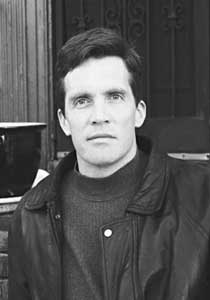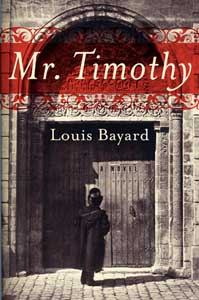Arts & Entertainment
Whatever happened to Tiny Tim?
Published Thursday, 04-Dec-2003 in issue 832
An interview with author Louis Bayard
If you were to imagine the post-Christmas Carol adult life of crutch-wielding Tiny Tim Cratchit, you probably wouldn’t place him as a resident of an 1860’s London whorehouse, but openly gay author Louis Bayard (Fool’s Errand, Endangered Species) has done just that in his latest novel, Mr. Timothy, a dark, shadowy narrative that is as much of a suspense-thriller as it is a classic Christmas tale.
Having just buried his father, Mr. Timothy Cratchit is also struggling to bury his past as a cripple and to shed his financial ties to his benevolent “Uncle” Ebenezer, which he does by living at a brothel in exchange for tutoring the house’s Madame and by dredging the Thames for dead bodies and the treasures that can sometimes be ferreted out of their bloated, watery pockets. Timothy is suddenly jolted out his day-to-day malaise when he discovers the bodies of two dead girls, both seared with the same mysterious brand on their upper arm, and thus begins Timothy’s adventure, one that leads him down a twisted trail in pursuit of something much more horrific than an ordinary killer.
This may not have all the glittery trappings of your typical Christmas story, but that is precisely what Mr. Timothy is intended to be, says Bayard.
“I think [the novel] is true to the spirit of Christmas. You know, all of the best Christmas stories come from a place of darkness. It’s the possibility of transformation — this enduring myth of Scrooge’s transformation that we see in A Christmas Carol — that we also see with Timothy as he finds a native goodness inside of himself, one not imposed upon him by his father.”
“I think [the novel] is true to the spirit of Christmas. You know, all of the best Christmas stories come from a place of darkness. It’s the possibility of transformation.…” Bayard admits that he has “long been intrigued by the thought of revisiting an old literary character” and that he selected Tiny Tim because he is the Dickens character that he liked the least.
“I just never believed in him,” he says with boyish indignation. “I never believed in a child, existing in that kind of situation, that would be that good and pure and uncomplaining and saintly as Tiny Tim was! I remember our third grade production of A Christmas Carol. I was little for my age so, of course, I was asked to play Tiny Tim. Well, I had a diva-fit, third grade version, because I wanted to play the boy that fetched the turkey, the boy who said, ‘The one big as me, sir!’ He was the real hero! I thought that was a far, far better role than Tiny Tim!
“So, I just got to thinking one day that Dickens didn’t tell us everything about this character, and from that impulse I decided to turn the character of Tiny Tim inside out.” Mr. Timothy is quite a departure from Bayard’s first two novels, Fools Errand and Endangered Species. His earlier works have been described as contemporary romantic comedies, ones that feature gay male characters, but his latest novel is neither romantic nor does it contain open references to homosexuality. In other, more simplified words, it is not a “gay novel.”
Bayard admits that a few gay media outlets have “bashed” Mr. Timothy for its exclusion of gay characters, and, in fact, that criticism makes him noticeably wince with a kind of bah-humbug frustration.
“There is a gay sensibility in this book,” he explains. “And that is the fact that what we consider as ‘family’ doesn’t only include the people you are born into, but those you acquire throughout your life. I dispute the idea that gay authors should only write about gay subjects or ideas.”
In fact, Bayard’s own life is an example of that fluid notion of family: He and his partner of 16 years, Don Montuori, have an adopted son from Cambodia named Seth, a combination of their mother’s names, Sonya and Ethel. They live in Washington, DC, but the couple first crossed paths while attending Northwestern’s Medill School of Journalism. Bayard tried flirting with Montuori at school, but it was only after a memorable encounter at the Boystown watering hole, Roscoes, that their romance really begin to generate sparks, as evidenced by the name of the family cat: Roscoe.
Bayard says that he will always be grateful to Alyson Publications, the publishing house that first “took a chance” on the author and his work. With Mr. Timothy, published by Harper Collins, Bayard says he is pleased to finally get what he considers proper “compensation for his work,” and that he is enjoying the heavy market penetration afforded by a larger publishing house. Publisher’s Weekly has given the book a starred review, and Entertainment Weekly put the title on its top 10 “Must List,” while offering the following in its Editor’s Choice review: “There isn’t one throwaway sentence in this fabulous Victorian mystery.”
Up next: Bayard really can’t reveal what his next project is about — mostly because he hasn’t written it yet. He’s still in research mode, but he can say this: It will involve Edgar Allen Poe in the role of a detective.
If Bayard can give us a Poe that is as charming and endearingly flawed as Mr. (Tiny) Timothy Crotchet, then “God bless us, every one!”
|
|
Copyright © 2003-2025 Uptown Publications



